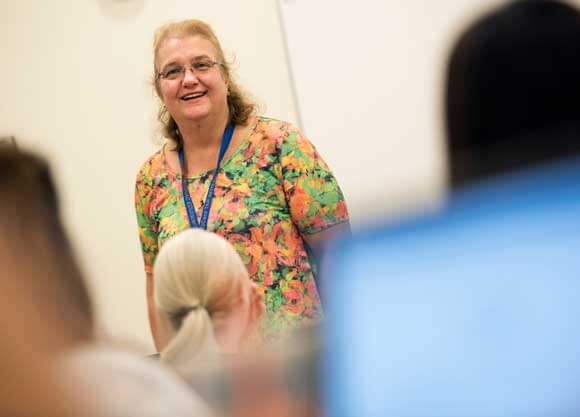
This fully online program prepares working nurses with the holistic skill set needed to transform health care and make an immediate impact on patient safety and standards of care within their current workplace and beyond.


This fully online program prepares working nurses with the holistic skill set needed to transform health care and make an immediate impact on patient safety and standards of care within their current workplace and beyond.

Our online Post-Master's Doctor of Nursing Practice in Nursing Leadership program equips working nurses with the advanced skill sets needed to expand their role as trusted healthcare leaders. The nursing leadership program explores the comprehensive responsibilities of a leader, including managing policy, finances and legal contexts as well as fostering a collaborative working environment. Graduates go on to serve as catalysts for elevating care, treatment and the overall experience of patients and their loved ones.
This program was designed with working nurses in mind and does not require on-campus instruction. Courses are delivered in an asynchronous format, allowing you to balance coursework into your schedule as you see fit.

Ines Zemaitis, DNP ’19
When the private practice she worked in for nearly a decade was taken over by a new health care group, nurse practitioner Ines Zemaitis, DNP ’19, found herself at a crossroads.
“I did not like how things changed when they took over,” she said. “Patients don’t want to be treated like numbers.”
Zemaitis quit her job and considered teaching full time, but opted instead to earn her nursing doctorate. She chose Quinnipiac’s DNP program for its philosophy on delivering holistic, patient-centered care.
“Our values matched,” Zemaitis said.
Even as she settled into life as a student, Zemaitis couldn’t resist the call of her profession. She began seeing patients again out of rented rooms in a colleague’s office. As her caseload increased, it became clear that she’d need her own space.
In 2017, the mother of three and full-time doctoral student took a leap of faith and opened her own practice, Connecticut Primary Care and Wellness, PC, in Middlebury.
“I’m still not quite sure how I did it,” she said, laughing.
Zemaitis was able to apply everything she was learning in courses about executive level leadership in the public health sector, from creating a business plan to managing staff and finances.
“My assignments reflected what I was actually doing at the time,” Zemaitis said.
In addition to DNP, Zemaitis can add CEO to her list of titles. She organized her practice into a corporation, naming fellow nurse practitioners who share her vision to her board of directors.
The Bachelor of Science in Nursing program, the Master of Science in Nursing program and the Doctor of Nursing Practice program at Quinnipiac University are accredited by the Commission on Collegiate Nursing Education, 655 K Street, NW, Suite 750, Washington, D.C. 20001, 202-887-6791.
Many of the nursing programs within Quinnipiac University’s School of Nursing also are endorsed by the American Holistic Nurses Credentialing Corporation. Graduates of these programs are eligible to take the appropriate national exam to become board-certified holistic nurses at the basic or advanced level of nursing:
Bachelor’s degree (HNB-BC)
Nurse practitioner graduate degree (APHN-BC or AHN-BC)
Our graduate admissions representatives are here to answer any questions you may have and help you navigate the application process.